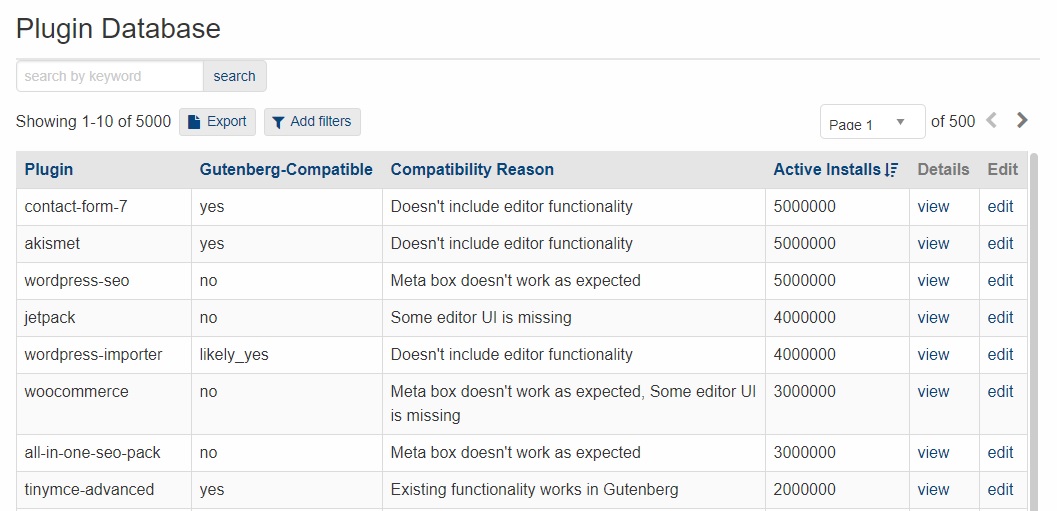The new content creating experience, the Gutenberg editor is soon going to be merged in the WordPress core as WordPress 5.0 ships out. As for now, Gutenberg is available as a plugin, so users can get the taste of what they will be dealing with in the future. With Gutenberg being the new editor, plugin compatibility is one of the most crucial concerns. You need to make sure your WordPress plugins are compatible with Gutenberg.
There are thousands of WordPress plugins available at your service, which work smoothly on the current editor. However, the main concern here is whether these plugins will be compatible with the new Gutenberg Editor or not. The changes brought by Gutenberg might not go along with the code or functionality used today. This might result in several errors and you might run into some issues on your website. That’s why it is better if you test out your favorite plugins to determine their Gutenberg compatibility. Below are two ways on how you can check if your WordPress Plugins are compatible with Gutenberg:
- Check on Gutenberg Plugin Compatibility database.
- Use a Staging Site to check for compatibility issues.
Check if your WordPress plugins are Gutenberg compatible in Gutenberg Plugin Compatibility Database
The first method to check if your WordPress plugins are compatible with Gutenberg is to check on Gutenberg Plugin Compatibility Database. The database currently holds information on 5000 WordPress plugins, including most of WordPress’ popular offerings.
Simply search for the plugin you want to check the compatibility of in the search box.
After you’ve searched for a specific plugin, you will be provided with the information of that plugin if it is on the plugin database. There is a section that reads ‘Gutenberg-Compatible’. This is where you can check if the plugin is compatible with Gutenberg. If the plugins you look up are compatible, you can also read about the bug that may pop up with Gutenberg under the ‘Compatibility Reason’ section.
As mentioned earlier, there are currently 5000 plugins in the Gutenberg Plugin Compatibility database. So, you’re likely to find the plugin that you want to check the compatibility of.
You can also help expand the database by contributing. If you want to contribute, register an account on the database’s website and you’d be able to set up an online test environment using the WP Sandbox service. This will help you create test environments with Gutenberg and a random plugin that isn’t part of the database yet. This prevents from having several users testing the same plugin. Learn more about the testing process here.
Having said that, now let’s move on to the second method of checking the Gutenberg compatibility.
Check if your WordPress Plugins are Compatible with Gutenberg using a Staging Site
Staging sites let you test the changes in a safe environment before you release them.There are plenty of ways to set up a staging copy of your website. Web hosts such as WP Engine, enable you to create staging versions of your site with a few clicks. If yours doesn’t, you can use Local by Flywheel or MAMP to create local WordPress testing environments.
To quickly test specific plugins for compatibility, create an installation using Poopy.life.

Once you’ve your website ready, you can install the Gutenberg plugin. After activating the Gutenberg plugin, go ahead and test your favorite plugins with it.
Testing the compatibility through this method is by downloading the plugin and testing it manually by installing it to your brand new WordPress install created by poopy.life. It is a simple process. Simply after installing the plugin, check if the plugin’s core features work as intended with the Gutenberg editor active.
And there you go. These were the two ways you can check the Gutenberg compatibility in WordPress.
The Gutenberg Editor is sure to bring vast changes in WordPress as it is all about the blocks. The editor will be a part of the WordPress core this year, so, if you haven’t already, download the Gutenberg editor and have a look at the future of WordPress.
Do you know any other way to check if your WordPress plugins are compatible with Gutenberg? Let us know through the comments.
Reference: Elegant Themes



